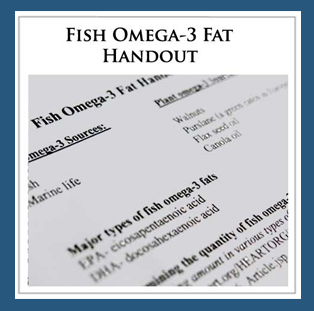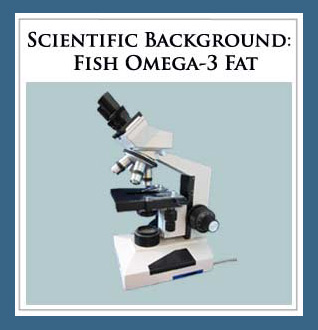The Benefits of Fish Omega 3 Fat
How Much to Ingest & How to Avoid Contaminants
There are substantial benefits of eating fish derived omega-3 fat. Fish omega-3 fat comes from marine life. This type of fat is initially created by algae and these fats then work their way up the marine food chain.
Plant derived omega-3 fats are different from fish omega-3 fats1. Plant omega-3 fats are found in foods such as flax seed oil, canola oil, and walnuts.Though plant omega-3 fats may be quite beneficial, there is not yet the level of proof of benefit that exists for fish omega-3 fats.2,3
Eating fish derived omega-3 fats has been found to be associated with a number of health benefits.For patients with a recent prior heart attack, as well as those with symptomatic heart failure, it has been proven that fish omega-3 fat intake can reduce the risk of death.4,5,6For patients with high cholesterol, it has been shown that fish omega 3 fat intake over a number of years reduced adverse cardiac events.7
Fish omega-3 fats have also been associated in some trials with a decrease in the frequency of depression8-11, though further trials in this area are needed.
Eating the omega-3 fats found in fish and fish omega-3 pills has been shown to lead to less inflammation and a reduction in some of the markers in the body that indicate inflammation.12,13 Benefit has been shown in patients with rheumatoid arthritis treated with high doses of fish omega-3 pills in small randomized trials.14-18
In these trials, rheumatoid arthritis patients taking fish omega-3 fats have been shown to have fewer painful joints, less need for pain medication, and a decrease in morning stiffness and markers of inflammation.
Hence, the benefit of fish derived omega-3 fats appears substantial with a reduction in risk of death and cardiac events, and a possible benefit in several other medical conditions.
In the randomized trials showing benefit in cardiac outcomes, two trials used capsules of 1000 mg of fish omega-3 fat daily5,6, but a third trial used capsules only when the trial participants couldn’t eat fish4. And the study which demonstrated a reduction in cardiac events in patients with elevated cholesterol used 1800 mg of fish omega-3 fat capsules daily7.
Currently, the American Heart Association recommends 1000 mg of fish omega-3 fat intake daily for patients who have documented coronary heart disease19, which means blockages of the arteries of the heart. For those without coronary heart disease, two servings of fish weekly are recommended. (Pregnant women, breast feeding women, and young children are advised not to eat certain fish because of mercury considerations.)
And, how does one ingest 1000 mg of fish omega-3 fat daily which is the dose most commonly used in the randomized trials showing benefit? Eating 3 ounces of salmon is a reasonable approximation for example20. However, in my experience, many patients who have been advised to achieve this level of fish omega-3 fat intake are not able to develop a sustained regular intake of fish.By this I mean to say that many people can’t pick up the habit of eating fish regularly and maintain it for years even when they try.
Fortunately, taking fish omega-3 pills is a relatively easy practice to maintain. The two major omega-3 fatty acids usually present in fish omega-3 pills are EPA and DHA, which have long fancy names, eicosapentaenoic acid (EPA), and docosahexaenoic acid (DHA). Fish omega-3 pills purchased in the store usually lists the amount of omega-3 fat simply as EPA and DHA.
The packaging of the fish omega-3 bottle will list how many mg of EPA and DHA is in each pill, making it relatively easy to calculate how many pills are required to obtain a combined total of 1000mg when the amounts of EPA and DHA are added together. For many brands it takes approximately 1-4 fish omega-3 capsules to add up to a combined total of 1000 mg of EPA and DHA, but it is necessary to check the label and then make the appropriate calculation.
Capsules of concentrated fish omega-3 fat can reasonably be substituted for fish intake because 3 of the 4 trials which showed a reduction in death rate or cardiac events used fish omega-3 capsules exclusively5-7, rather than fish.
What about contaminants?
Mercury levels are usually negligible or undetectable in fish omega-3 supplements. This is because mercury primarily resides in the meat of the fish, rather than the fat, and is markedly reduced in the extraction process of the fish omega-3 fats21.Though usually low, there can be significant variability22 in the presence of environmental toxins such as polychlorinated biphenyls, better known as PCBs. PCBs and other contaminants can be markedly reduced to very low levels by a frequently used beneficial manufacturing process called molecular distillation which helps purify and concentrate fish omega-3 fats. 23,24
In regards to side effects, fish omega-3 capsules in the studies previously mentioned were generally well tolerated25. Fish omega-3 fats, though, can increase bleeding problems or require adjustment of medications in patients with preexisting bleeding disorders, or those patients on blood thinners.
Fish omega-3 fat intake, at typical dosages, is usually well tolerated in conjunction with aspirin usage5,6, but this needs to be reviewed with your personal physician PRIOR to starting fish omega-3 fat intake.
The most common side effects of fish omega-3 fat intake are gastrointestinal symptoms, including belching which is often associated with a fish oil taste. This occurs in approximately half of the patients that take the routine over the counter pills. However, this usually completely resolves, in my experience, in the vast majority of these patients when they simply switch to an enteric coated form of fish omega-3 capsules.
This type of fish omega-3 capsules has a coating allowing the pills to pass through the stomach prior to dissolving. However, for those that tolerate the routine fish omega-3 capsules, the enteric coated capsules have no significant advantage.
Interestingly, there are only four randomized diet studies which have shown a significant reduction in death rate4-6,26. All of these trials involved cardiac patients. Three of these studies showing a reduction in death rate were the result of either taking fish omega-3 capsules or eating fish4-6. The only other randomized diet study that showed a survival benefit was with the Mediterranean diet26,27.
One potentially very healthy approach to eating, in my opinion, is to combine a Mediterranean diet with a fish omega-3 fat intake of 1000 mg daily. A video describing the details of the Mediterranean diet is available on this web site.
However, before considering any major change in diet, or starting to take fish omega-3 fat supplements, it is recommended that this be discussed with your physician prior to making any changes.
In conclusion, I wish you success in all your efforts for achieving and maintaining good health.
References:
1. Gebauer SK, Psota TL, Harris WS, Kris-Etherton PM. n-3 fatty acid dietary recommendations and food sources to achieve essentiality and cardiovascular benefits. Am J Clin Nutr. 2006;83:1526S-1535S.
2. Campos H, Baylin A, Willett WC. Alpha-linolenic acid and risk of nonfatal acute myocardial infarction. Circulation. 2008;118:339-45.
3. Breslow JL. n-3 fatty acids and cardiovascular disease. Am J Clin Nutr. 2006;83:1477S-1482S.
4. Burr ML, Fehily AM, Gilbert JF, et al. Effects of changes in fat, fish, and fibre intakes on death and myocardial reinfarction: diet and reinfarction trial (DART). Lancet 1989;ii:757-61.
5. GISSI-Prevenzione Investigators. Dietary supplementation with n-3 polyunsaturated fatty acids and vitamin E after myocardial infarction: results of the GISSI-Prevenzione trial. Lancet 1999;354:447-55.
6. GISSI-Prevenzione Investigators, Tavazzi L, Maggioni AP, Marchioli R, et al. Effect of n-3 polyunsaturated fatty acids in patients with chronic heart failure (the GISSI-HF trial): a randomised, double-blind, placebo-controlled trial. Lancet 2008;372:1223-1230.
7. Yokoyama M, Origasa H, Matsuzaki M, et al.; Japan EPA lipid intervention study (JELIS) Investigators. Effects of eicosapentaenoic acid on major coronary events in hypercholesterolaemic patients (JELIS): a randomised open-label, blinded endpoint analysis. Lancet. 2007;369:1090-8.
8. Rondanelli M, Giacosa A, Opizzi A, et al. Long chain omega 3 polyunsaturated fatty acids supplementation in the treatment of elderly depression: effects on depressive symptoms, on phospholipids fatty acids profile and on health-related quality of life. J Nutr Health Aging. 2011;15(1):37-44.
9. Tajalizadekhoob Y, Sharifi F, Fakhrzadeh H, et al. The effect of low-dose omega 3 fatty acids on the treatment of mild to moderate depression in the elderly: a double-blind, randomized, placebo-controlled study. Eur Arch Psychiatry Clin Neurosci. 2011 Feb 12. [Epub ahead of print]
10. Lespérance F, Frasure-Smith N, St-André E, et al. The efficacy of omega-3 supplementation for major depression: a randomized controlled trial. J Clin Psychiatry. 2010 Jun 15. [Epub ahead of print]
11. Liperoti R, Landi F, Fusco O, Bernabei R, Onder G. Omega-3 polyunsaturated fatty acids and depression: a review of the evidence. Curr Pharm Des. 2009;15:4165-72.
12. Calder PC. n-3 polyunsaturated fatty acids, inflammation, and inflammatory diseases. Am J Clin Nutr. 2006;83:1505S-1519S.
13. Dangardt F, Osika W, Chen Y, Nilsson U, et al. Omega-3 fatty acid supplementation improves vascular function and reduces inflammation in obese adolescents. Atherosclerosis. 2010;212:580-5.
14. Geusens P, Wouters C, Nijs J, Jiang Y, Dequeker J. Long-term effect of omega-3 fatty acid supplementation in active rheumatoid arthritis. A 12-month, double-blind, controlled study. Arthritis Rheum. 1994;37:824-9.
15. Kremer JM, Lawrence DA, Petrillo GF, et al. Effects of high-dose fish oil on rheumatoid arthritis after stopping nonsteroidal antiinflammatory drugs. Clinical and immune correlates. Arthritis Rheum. 1995;38:1107-14.
16. Volker D, Fitzgerald P, Major G, Garg M. Efficacy of fish oil concentrate in the treatment of rheumatoid arthritis. J Rheumatol. 2000 Oct;27(10):2343-6.
17. Ruggiero C, Lattanzio F, Lauretani F, et al. Omega-3 polyunsaturated fatty acids and immune-mediated diseases: inflammatory bowel disease and rheumatoid arthritis. Curr Pharm Des. 2009;15(36):4135-48.
18. Bahadori B, Uitz E, Thonhofer R, et al. omega-3 Fatty acids infusions as adjuvant therapy in rheumatoid arthritis. JPEN J Parenter Enteral Nutr. 2010;34:151-5.
19. Kris-Etherton PM, Harris WS, Appel LJ. American Heart Association, Nutrition Committee. Fish consumption, fish oil, omega-3 fatty acids, and cardiovascular disease. Circulation. 2002;106:2747-57.
20. USDA SR-24 Atlantic salmon, raw, wild; 3oz. U.S. Department of Agriculture, Agricultural Research Service. 2011. USDA National Nutrient Database for Standard Reference, Release 24. Nutrient Data Laboratory Home Page, http://www.ars.usda.gov/ba/bhnrc/ndl
21. Harris WS. Fish oil supplementation: evidence for health benefits. Cleve Clin J Med. 2004;71:208-220.
22. Rawn DF, Breakell K, Verigin V, Nicolidakis H, Sit D, Feeley M. Persistent organic pollutants in fish oil supplements on the Canadian market: polychlorinated biphenyls and organochlorine insecticides. J Food Sci. 2009;74:T14-19.
23. Rossi PC, Pramparo MD, Gaich MC, Grosso NR, Nepote V. Optimization of molecular distillation to concentrate ethyl esters of eicosapentaenoic (20:5 ω-3) and docosahexaenoic acids (22:6 ω-3) using simplified phenomenological modeling. J Sci Food Agric. 2011 Mar 7. doi: 10.1002/jsfa.4332. [Epub ahead of print]
24. Esterification of fish oil which results from molecular distillation, i.e. “the loss of natural triglyceride form”, is not a problem given that 3 randomized trials that established mortality benefit exclusively used marine omega-3 capules with the omega-3 in an esterified form rather than a triglyceride form. -E. Roehm
25. https://www.ncbi.nlm.nih.gov/pubmed/28552094
26. de Lorgeril M, Renaud S, Mamelle N, Salen P, Martin JL, Monjaud I, Guidollet J, Touboul P, Delaye J. Mediterranean alpha-linolenic acid-rich diet in secondary prevention of coronary heart disease. Lancet. 1994;343:1454-9.
27. Renaud S, de Lorgeril M, Delaye J, et al. Cretan Mediterranean diet for prevention of coronary heart disease. Am J Clin Nutr 1995;61(suppl):1360S-7S.
NutritionHeart.com E. Roehm, M.D. 2011 Video: Benefits of Fish Omega 3 Fat
Fish Omega 3 Fat Video Page- Eric Roehm, MD


